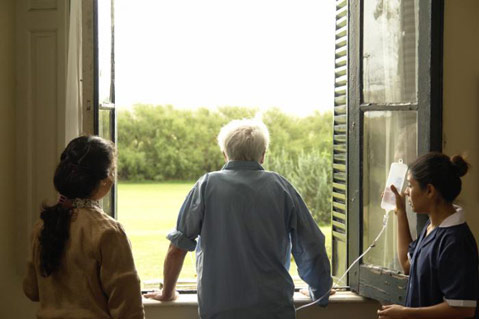Memories as Manna
Carlos Sorin's The Window Comes to the Lobero

Happy memories can be like manna for those on their deathbeds, living their last days unable to do much more than eat and sleep.
Such a sentiment forms the core of The Window, the refreshingly short yet emotionally sweeping film from Argentine director Carlos Sorin. Starring Uruguayan author/actor Antonio Larreta in the role of the dying Antonio Romero, the visually beautiful, ponderously paced film is set on the remote Patagonian pampas, where the man awaits the final visit from his prodigal-ish son, as life – peppered by piano tuners, caring doctors, escape voyages, and attentive nurses – revolves around him.
Sorin was recently able to answer a few questions by email about his film, which screens twice this Friday, July 24, at the Lobero Theatre.
Was this story inspired by a dying relative?
It is very difficult for me to determine the motive why I make a particular film and not another. The moment in which the story appears is preceded by many ideas that appear and disappear, creating in me both enthusiasm and disappointment, until a story pushes forth more strongly. In the case of The Window, certain readings – Raymond Carver, Anton Chekhov – must have had something to do with it. And probably the death of my father, about a year before, must have laid out the ground.
Do you see yourself as more of the son in this story, or as the father?
In a type of film such as this one, it is hard not to be self-referential. I get ideas not only from what I have read, the films I have seen, the news I read, or what takes place around me, but also from my personal history. I am a bit the father and also the son.
The landscape of Patagonia is very prominent in this film.
I think that the landscape in The Window is not just a background on which the story takes place; it is, dramatically speaking, a character. Because the landscape is nothing if not the object of desire – it is life, for someone who is reaching the finish line. If The Window were a love story, the landscape would be the loved woman – an impossible woman, indifferent, distant.
There’s an interesting mix of city folks and rural people. Is that tension a part of modern life in Argentina?
This must also be self-referential. I had lived all of my life in the city, but 15 years ago, I moved to the countryside. For the people of Buenos Aires, at least, who live in such a tense city, the countryside is a symbol of the original, of lost virginity. Everyone says, or thinks, “In a few years I will leave all of this behind and I will go to live in a hut in the southern lakes.” It represents lost purity. That’s in people’s collective imagination, but in reality, it’s not necessarily so. In the countryside life is hard, cruel, and not an idealized picture card.
What is your experience with Patagonia?
It comes from my adolescence. I did my military service there and then kept on returning – maybe inspired by reading the travel books of European naturalists who visited Patagonia in the 19th century, and left behind fascinating, delicious accounts. In that century Patagonia was the end of the world, an adventure zone. Now, when the whole planet is known and watched, it keeps on having the same air of mystery and adventure when I visit.
Tell me more about the notion of memory and dream, which are integral to the film.
They say that the most distant memories live in very deep areas of the brain, and they come back in old age. It is actually quite understandable – for an old man, everyday life becomes unpleasant, and he has become a rejected object for those around him, so only the memories of that happy past can make his life bearable. It is a way to survive. And if it were the opposite? If that were our real life and this, today, a nightmare? A film critic told me a while back: “I have interpreted your film backwards. The present time is that of his childhood, and all the rest of the film his dream.”
How was it working with Antonio Larreta? Did he relate to the story?
Antonio is a very pleasant person; very sensitive and very intelligent. It was a pleasure working with him. Not only did he identify with the character, in reality he created it. Antonio Romero is a creation of Antonio Larreta.
4•1•1
The Window screens at the Lobero Theatre on Friday, July 24, at 7 and 9:30 p.m. See lobero.com or call 963-0761.



